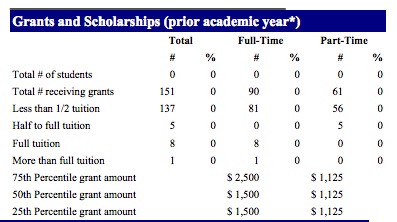University of North Texas v. American Bar Assn.
- by
- Sep 15, 2016
- Law School, News
- Reviewed by: Matt Riley


Oh god, not another law school. It’s hard to believe, but new law schools continue to sprout up even as application numbers fall—a reflection of the poor job market for lawyers.
Enter the University of North Texas Dallas College of Law. Founded in 2014, this young law school promises to be different: it boasts a low cost of attendance and a commitment to public-interest law.
Let’s take a look.
Cost
In-state tuition at UNTDCL will set you back only about $14,000, whereas you can expect to pay about $46,000 at the infamous, yet ABA-accredited, Thomas Jefferson School of Law.
The price tag at UNTDCL is definitely something to envy. And while they do have a typo in their grants/scholarships disclosures, they don’t seem to be too stingy either:

Class Profile
While your LSAT score and GPA aren’t everything, they’re pretty darn good predictors of how you’ll do in your first semester of law school. These may also color the way your employers perceive you and your fellow graduates.
Here are the 25th and 75th percentiles for UNTDCL’s full-time and part-time programs:
Full time GPA: 2.67 – 3.40
Full time LSAT: 143 – 149
Part time GPA: 2.64 – 3.36
Full time LSAT: 142 – 150
That’s not great, but they still beat Thomas Jefferson.
Anyway, you don’t have to be a genius to do a lot of legal work. As long as the school sets students’ expectations well by being as transparent as possible about employment outcomes, law school applicants can make the right choice for themselves. And it’s here that UNTDCL has a slight problem.
Employment Outcomes
UNTDCL says that it will begin reporting employment outcomes in May 2017. That’s when its first full-time class will graduate. They can do better than that.
True, most public interest hiring tends to happen very late in law school. But to have a decent shot at full-time legal employment you need at least two summers’ worth of legal experience, if you’re a full-time student. Are UNTDCL students getting this kind of experience? Potential applicants have no idea.
I would also like to see more about what the school is doing to help its students pass the bar exam. If you don’t pass the bar exam, you don’t get to practice law, so the bar exam is very closely related to employment outcomes.
Here’s what the school says:
We believe that a rigorous, competency-based curriculum can and should include moving toward readiness to pass the bar exam. Substantive knowledge of law, legal reasoning, and writing are primary areas covered on the bar exam (taking into account both the national and the state portions of the exam). Thus, while our educational goals are not identical to preparing students for bar passage, these goals do include much of the knowledge and skills needed for bar passage.
What da heck does that mean? How much is “much of” the knowledge and skill need to pass the bar? (By the way, on the LSAT that would mean “some” or at least one skill/bit of knowledge.)
The school does list several bar-prep books in its “Course Book” list, including this gem: If I Don’t Pass the Bar I’ll Die: 73 Ways to Keep Stress and Worry from Affecting Your Performance on the Bar Exam.
But is it offering students an actual, proven bar prep class? Kaplan? Barbri? A local company with a proven track record? It doesn’t seem like it.
Verdict
I doubt we need another law school, even one committed to public interest law. Full-time legal public interest jobs are EXTREMELY hard to find. But at least one law professor is pulling for the school to succeed. Transparency wise, the school is doing the right ABA-required things, but nothing I’d consider special.
Search the Blog

Free LSAT Practice Account
Sign up for a free Blueprint LSAT account and get access to a free trial of the Self-Paced Course and a free practice LSAT with a detailed score report, mind-blowing analytics, and explanatory videos.
Learn More
Popular Posts
-
logic games Game Over: LSAC Says Farewell to Logic Games
-
General LSAT Advice How to Get a 180 on the LSAT
-
Entertainment Revisiting Elle's LSAT Journey from Legally Blonde








